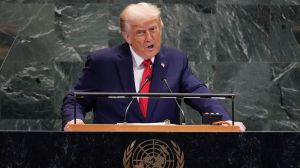These Aprils of forgetfulness
April has not been a month of lull. It has made every effort to keep itself in history. The distance of time (and often one of space too) complicates the act of remembering...

April has not been a month of lull. It has made every effort to keep itself in history. The distance of time (and often one of space too) complicates the act of remembering — or is “remembering” the right word if you have not been at least alive at the moment? In any case, for that unfortunate animal posterity, historical anniversaries are, at best, symbolic reminders, somewhat akin to the bookmarks of a collective memory spanning generations.
How events in Tibet unfold will determine how we remember Tibet — in terms of the Chinese narrative or the Tibetan. Embedded in forgetting is the manner of remembering, decided by the course of history. China is not a distant colonial power. Being right next door to Tibet, it will not go away. Therefore, if the Tibetans could not visibly observe their anniversaries (and protest too) how long would the world remember Tibet?
Let’s try our collective memory with April. On April 2, 1982, Argentina invaded the Falkland Islands (or Las Malvinas), provoking a British response it did not expect. April 26 mourns the 1937 bombing of Guernica. Abraham Lincoln was shot by J.W. Booth on April 14, 1865. James Earl Ray killed Martin Luther King Jr on April 4, 1968. On April 12, 1961, Yuri Gagarin entered outer space. Buchenwald was liberated on April 11, 1945. The American War of Independence began at Concord and Lexington on April 19, 1775. Hitler was born in Braunau on April 20, 1889, and found dead on April 30, 1945 in the Führerbunker. April 30, back in 711, was also the beginning of the Moorish conquest of Spain… And, in the twilight zone where history and legend meet, Romulus and his forgettable brother may have founded Rome around April 20 in c.750 BC.
None of these anniversaries will be collectively forgotten for a while. Yet, we cannot, individually, name more than a handful a month. The danger inherent in an individual losing the information encoded in his brain depends on his relative positioning and “value” in a socio-historical context. But when a society forgets its past, it becomes weaker, since public remembering and scholarly knowing are altogether distinct. Remembering is a political act — it invests significance in historical information, thereby enabling the use of what is remembered.
And yet, forgetting what happened centuries ago is less dangerous than turning amnesiac with regard to what occurred just a decade back. (What do we collectively remember of the bloody first half of the 20th century or of the no less significant ’80s and ’90s?) While forgetting can be natural, gradual and automatic, it is often state-enforced or market-induced — although, as witnessed in capitalist democracies, the state and the market may merely half-consciously collaborate in diverting public interest.
In totalitarian states, as in the erstwhile East Bloc, collective forgetting has been a state-enforced practice, moulded into an art. When street names and state heroes change overnight (and disappear for ever), when books burn to erase the memory of a writer and his ideas or to suppress a culture (as with the onetime Papal sport of Talmud burning), people do burn. And not necessarily the way Calvin burnt Michael Servetus. After their mass murders, Hitler and Stalin will always be accountable for their assault on the intellect — in the tradition of, say, the Reconquista and the bloody expulsion of the Moors (with the burning of their books). With every cultural death, we lose knowledge and thereby a sense of a usable past since there is little left to remember.
Therefore, the real danger in Tibet is not the political status of the land, except to the extent that a change there would mitigate that danger. The real danger is the systematic, and automatic, erasure of what has for long been the face and soul of Tibet. One day, even China may forget that Tibet existed.
Paradoxically, when the state makes you forget, you often suffer a reactionary total recall someday when the state itself undergoes deep structural changes. Witness the Czarist nostalgia in Russia or the tears for Marie Antoinette. Thus while you may be tempted to laugh the devil’s laughter at the meaninglessness of it all, as Mr Kundera (who couldn’t take the enforced forgetting any longer) would say, the Chinese, like the Soviet establishment, laugh like the angel who knows the usefulness of remembering, only in order to make others forget.
China is afraid about Tibet, it is also afraid of Tibet. It will not cease till it has made Tibet as irrelevant as its own characterless new cities. Since language is the first marker of cultural identity and it remains the primary link of a people to their past, its loss seals a cultural death — and a political death. And since it is difficult to destroy, the victor invariably aims to destroy it. Tibet will become an integral part of China when, finally, its myriad languages are no longer spoken within its territory.
History is a skeleton lurking in our cupboards which will out. China should beware of that skeleton. It should relearn its own recent history, unlocking the floodgates on the Cultural Revolution. Then it can begin to learn those of others so as to respect them. History is a powerful political tool. That is why the Tyrant fears it, but learns and remembers enough to destroy it. That is why democratic India must allow Tibetan exiles their anniversaries and protests so that others don’t forget.
sudeep.paul@expressindia.com
Photos



- 01
- 02
- 03
- 04
- 05




























